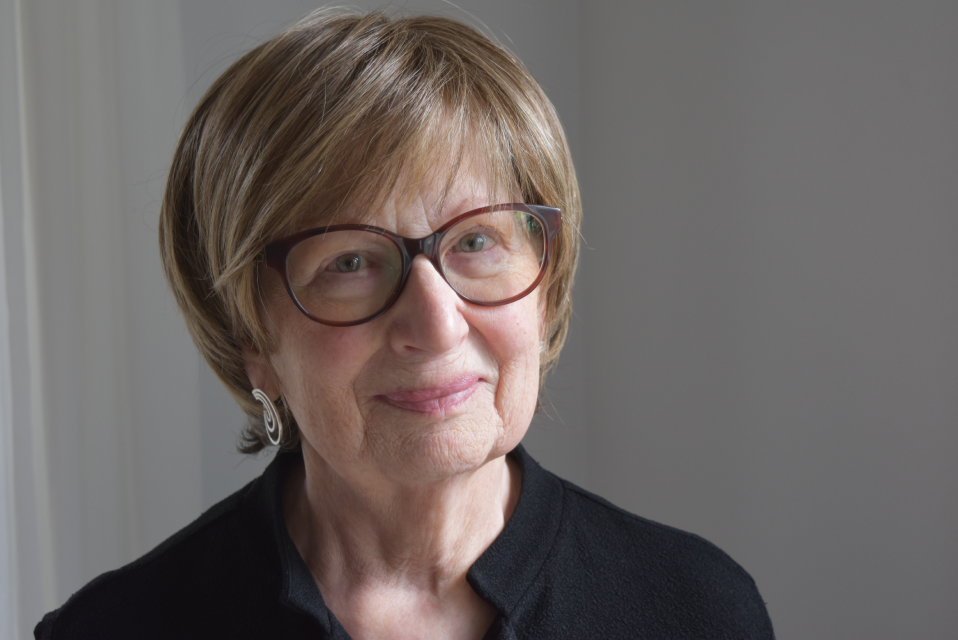When Susan Kress (then Susan Aaronson) arrived at Darwin to begin her PhD in 1966, the fledgling College had only been founded two years earlier. But the elements regarded 60 years later as distinctively Darwinian points of pride were already in place.

Photo: Susan Kress
“The fact that it was an entirely graduate College really appealed to me. There were students from all over the world, so it opened up new horizons – it was incredibly international and cosmopolitan. And the fact that it accepted both men and women, at a time when all the other Colleges were single-sex, also attracted me, having grown up in the single-sex grammar school system after taking the 11 plus.”
The novelty of creating a Cambridge College from scratch was not lost on this early cohort.
“The fact that it was new – yet within this place of great tradition and ancient towers – was really exciting.”
With so few students, all studying at postgraduate level, there were far fewer hierarchies or divisions between Fellows and students than was the norm in other Colleges, although Susan disputes the idea that there was no dividing line at all.
“I wouldn’t say we were buddies,” she clarifies. “But there was definitely collegiality. I remember the librarian, John Oates, a genial, generous man – he was delightful. And the Dean, Philip McNair was very convivial. He and his wife would entertain us in their home, as did the Associate Dean, Sylvia Fitton Jackson.”
There were 46 students at Darwin in the autumn of 1966, and the College was growing rapidly. Eating together in the evening was regarded as an important factor in fostering collegiate relationships.
“There was a strong sense of community,” Susan recalls. “There was a sort of unwritten rule that you wouldn’t talk about your subject at dinner, in an attempt to make the conversation more wide-ranging. I suppose so that you didn’t get so isolated within your subject that you couldn’t communicate with the wider world!”
After Darwin, Susan married fellow Darwinian Jack Kress and moved with him to his native United States. Following a brief stint teaching in Albany she began a 40-year career at Skidmore College in Saratoga Springs, upstate New York, as a literary scholar and feminist. She served as Vice President for Academic Affairs from 2006-12, and as Acting President during the sabbatical of the President, and has written an acclaimed biography of Carolyn G. Heilbrun, Feminist in a Tenured Position.
Her feminism developed in line with the wider feminist awakening in America in the early 1970s.
“I was clueless,” she says of her time at Darwin. “You just got used to the fact that some things were unequal. Like the fact that, other than Darwin, there were three or four women’s Colleges and all the rest were men only – it didn’t occur to us that that was a problem. But once I got to the States there was a wind blowing. Betty Friedan’s The Feminine Mystique had come out, and although it’s much criticised now as too white, too middle-class, too straight – all of which is true – it was a hugely important book. I met women who opened my eyes, I joined consciousness-raising groups, and from then on I read literature in a different way and saw the world in a different way.”
Recent backtracking on decades of progress towards gender equality in the United States, such as the repeal of Roe versus Wade, has left Susan distressed by recent political developments.
“My heart is broken – I’m looking at my 17-year-old granddaughter and deeply concerned by the stripping away of her rights.”
Over the course of Susan’s four decades at Skidmore, the college has transformed beyond recognition, rising up the ranks to become the first choice of many students from across the country and, indeed, from many countries. Its gender balance has also completely shifted.
“When I came it was changing from a women’s college to co-ed. They made the switch in 1971, and I arrived in 1975. For a while it was considered a triumph if you had two men in a class you were teaching, but that gradually changed.”
With an enhanced reputation have come ever changing student demographics.
“It’s become a more desirable place to come, so we’re getting many more applications and it’s much more diverse than it used to be. But it’s interesting to look at how diverse Cambridge was in the 1960s. People came from all over the world to study there.”
Since her retirement in 2012, Susan has served on the board of her local public television station, as well as that of AROHE, the Association of Retirement Organizations in Higher Education.
“AROHE’s mission is to transform retirement. To demonstrate the ways in which retirees are still assets to their communities, as well as to support their wellbeing. More and more of us are lucky enough to age, but that can lead to increased isolation, and we’re not necessarily liked by younger people who want our jobs, our homes and their inheritance!”
Susan herself appears in no danger of retreating into isolation in the next phase of her life. As well as her active community engagement (“I can’t lose the habit of service,” she acknowledges), she is nurturing a newly discovered talent for poetry, with many publications to her name, and a book in the works.
“It’s very joyful!” she says of this new pursuit. “It’s bringing me a lot of pleasure.”
